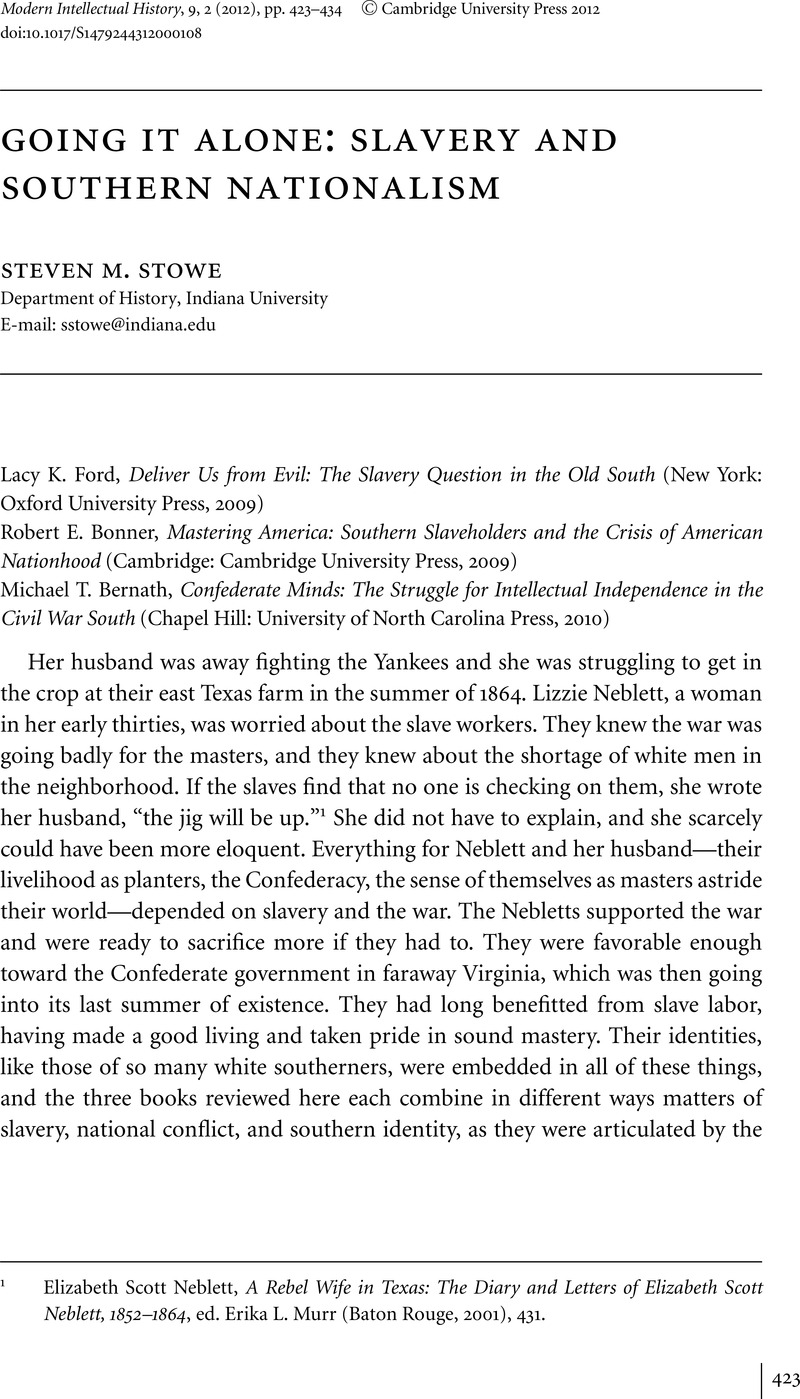No CrossRef data available.
Article contents
GOING IT ALONE: SLAVERY AND SOUTHERN NATIONALISM
Review products
Published online by Cambridge University Press: 10 July 2012
Abstract

Information
- Type
- Review Essays
- Information
- Copyright
- Copyright © Cambridge University Press 2012
References
1 Neblett, Elizabeth Scott, A Rebel Wife in Texas: The Diary and Letters of Elizabeth Scott Neblett, 1852–1864, ed. Murr, Erika L. (Baton Rouge, 2001), 431Google Scholar.
2 The first view has been argued by Escott, Paul D., most recently in The Confederacy: The Slaveholders’ Failed Venture (Westport, CT, 2010)Google Scholar. For the second view, see Gallagher, Gary W., The Confederate War: How Popular Will, Nationalism, and Military Strategy Could Not Stave off Defeat (Cambridge, MA, 1997)Google Scholar. For a more heated view of how the sheer carnage of the Civil War excited an unbalanced popular nationalism, see Royster, Charles, The Destructive War: William Tecumseh Sherman, Stonewall Jackson, and the Americans (New York, 1991)Google Scholar, and, with a focus on soldiers, Phillips, Jason, Diehard Rebels: The Confederate Culture of Invincibility (Athens, GA, 2007)Google Scholar.
3 A story told most recently and definitively by Freehling, William W., The Road to Disunion, 2 vols. (Oxford, 1990)Google Scholar.
4 For example, Morgan, Philip D., Slave Counterpoint: Black Culture in the Eighteenth-Century Chesapeake and Lowcountry (Chapel Hill, NC, 1998)Google Scholar and Rothman, Adam, Slave Country: American Expansion and the Origins of the Deep South (Cambridge, MA, 2005)Google Scholar.
5 Ford, Deliver Us from Evil, 356.
6 Ibid., 453. The theme of fear and greed runs throughout the book, but see, for example, 117, 143, 194.
7 Phillips, Ulrich B., American Negro Slavery (New York, 1918)Google Scholar; Stampp, Kenneth M., The Peculiar Institution: Slavery in the Ante-Bellum South (New York, 1956)Google Scholar; Genovese, Eugene D., Roll, Jordan, Roll: The World the Slaves Made (New York, 1972)Google Scholar. Slave-owners themselves rarely used the term “paternalism.” Instead, they spoke of being “good” or “Christian” masters, evoking what they perceived as fair or morally upright treatment of bonded labor, in part because paternalism in the fully fledged European sense had no counterpart in antebellum America. Most historians of slavery agree with the testimony of many former slaves that “good” masters provided at least a few better working conditions than harsher masters.
8 Ford, 508.
9 Ibid., 532.
10 Ibid., 357. On Charles Colcock Jones see Clarke, Erskine, Dwelling Place: A Plantation Epic (New Haven, 2005)Google Scholar.
11 Bonner, Mastering America, xvi. On the hemispheric ambitions of slaveholding southerners and their allies see May, Robert E., The Southern Dream of a Caribbean Empire, 1854–1861, 2nd edn (Gainesville, 2002)Google Scholar; Guterl, Matthew Pratt, American Mediterranean: Southern Slaveholders in the Age of Emancipation (Cambridge, MA, 2008)Google Scholar; Streeby, Shelley, American Sensations: Class, Empire, and the Production of Popular Culture (Berkeley. CA, 2002)Google Scholar.
12 The ambiguities resulting from the fact that American nationalism and American regionalism were simultaneously in partnership and conflict are explored in terms of political culture in Waldstreicher, David, In the Midst of Perpetual Fetes: The Making of American Nationalism, 1776–1820 (Chapel Hill, NC, 1997)Google Scholar.
13 Ibid., xix.
14 Bernath, Confederate Minds, 4.
15 Ibid., 80.
16 Ibid., 157.
17 Ibid., 221, 291, 212.
18 Ibid., 246.
19 Ibid., 277. Stephanie McCurry argues that the Confederacy was in effect brought down by an exclusionist blindness which ignored white women and people of color who made up the polity's majority even if male slave-owners did not count them as citizens. See her Confederate Reckoning: Power and Politics in the Civil War South (Cambridge, MA, 2010).

